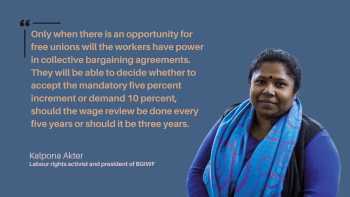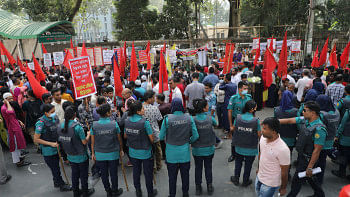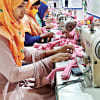We wouldn't be worried about US labour policy if we upheld labour rights

The recent memorandum on labour rights issued by the United States is grounded in their foreign labour policy. This policy is not targeted at any specific country, but, according to them, will be applied wherever labour rights are disregarded.
We don't know if this policy will be implemented immediately, but countries with widespread labour rights violations should be wary of its potential impact. Therefore, it is crucial for our own country to examine its labour rights record, and the focus should be on ensuring that labour rights are upheld, instead of external rhetoric or potential sanctions.
The recent wage movement by RMG workers serves as a stark evidence of what happens when healthy union practices are suppressed and workers' unionisation rights are restricted. Had these workers had a platform for dialogue and collective bargaining within their respective factories, they would not be compelled to resort to protests. The brutal police crackdown on these protests, the evident political involvement, and the tragic loss of workers' lives would not have occurred if workers enjoyed the freedom to exercise their union rights.
We cannot deny the fact that labour rights are routinely violated in Bangladesh. There is a blatant infringement of workers' freedom of association. Even with the ILO Convention and existing labour rights laws, workers struggle to freely exercise their union rights. Joining a union often carries the stigma of criminality, and workers' attempts to advocate for their rights are met with retaliation and intimidation. Despite many reassurances by the Bangladesh government, it has repeatedly failed to keep its promises, including appropriate amendment of our labour law.
It's true that there are more unions registered now compared to a decade ago. However, mere registration of unions does not mean that each of them has effective bargaining agreements. Only a handful of unions have such agreements, and even those are functioning with difficulties. While the number of unions has risen, they have failed to foster a culture of healthy union practices.
The recent wage movement by RMG workers serves as a stark evidence of what happens when healthy union practices are suppressed and workers' unionisation rights are restricted. Had these workers had a platform for dialogue and collective bargaining within their respective factories, they would not be compelled to resort to protests. The brutal police crackdown on these protests, the evident political involvement, and the tragic loss of workers' lives would not have occurred if workers enjoyed the freedom to exercise their union rights. This constitutes another, severe labour rights violation.
When labour rights violations occur or unfair labour practices take place, we are supposed to go to court, right? But the workers cannot file complaints under such circumstances, per Section 195 of the labour law. As workers cannot directly approach the courts to file a case, they must first navigate the bureaucratic maze of the Department of Labour (DoL). The DoL often engages in protracted meetings, prolonging the complaint process. Out of 100 complaints lodged with the DoL, barely two receive approval for court proceedings. In those court proceedings, the DoL's performance is noticeably dismal: in 90 percent of the cases, they fail to win a conviction against the employer. DoL's failure to protect the union leaders from being victimised by the employers and its inability to enforce reinstatement of terminated union leaders have virtually destroyed the leaders' ability to meaningfully represent the workers.
The practice of running industries while paying workers abysmally low wages is another flagrant violation of labour rights. With the wages they get, they cannot afford adequate nutrition, yet they are expected to maintain or even increase production levels. It is unreasonable to expect optimal productivity from workers who are denied proper sustenance.
Within the RMG sector alone, approximately 40-42 lakh workers are employed, yet their children's education needs are largely neglected. Most of their children are deprived of education opportunities due to financial constraints. Neither the industry owners nor the government have taken any steps to ensure better educational prospects for workers' children. Gender-based violence in the workplace is another pervasive issue, yet there are no specific laws or protection mechanisms in place. Workers are left to endure these abuses in silence.
If this is the situation with labour rights in the country, we should fear not only the repercussions of the US memorandum, but also potential actions of the European Union, which is discussing the implementation of human rights due diligence. Moreover, we are currently pursuing an Everything but Arms (EBA) status under Generalised System of Preferences (GSP) for the European market, but this agreement also comes with stringent rules and regulations. If the current conditions persist, there is a risk of restrictions on multiple fronts.
While we have made significant strides in ensuring workers' safety in the RMG sector since the Rana Plaza tragedy, our ability to confidently declare our RMG factories safe remains limited. Beyond this industry, the situation is far bleaker, as evidenced by incidents like the Hashem Food Factory fire, where workers, including many children, were burnt to death. Our government and RMG factory owners proudly boast numerous certified green and platinum factories. While this is commendable, if you examine closely, you'll notice a glaring disconnect between their certifications and labour rights practices. The focus has been on green certifications, carbon emissions and other environmental aspects, while the fundamental issue of fair wages and worker treatment has been overlooked.
Now, coming to the mention of my name in the context of the US memorandum, it is crucial to acknowledge the hardships that our organisation, colleagues and I have endured. We have faced lawsuits, imprisonment, and harassment related to our organisational registration. In 2012, one of my colleagues went missing, and his dead body was found later, but the real perpetrators are yet to be brought to justice. Six months ago, another colleague was brutally beaten to death while assisting workers in reclaiming their unpaid wages.
During the wage movement in 2016, my colleague was imprisoned for two and a half months. He had not committed any crime there. He was blindfolded and taken to a field, where he was told to run. We have faced such situations repeatedly.
If advocating for workers' rights exposes us to such risks, how can I be assured of my own safety? These are long-standing issues, and the US Embassy must be aware of them. Perhaps, it is due to these long-standing issues that they mentioned my name. However, I believe that there is no need for any government or foreign entity to seek our individual opinions on the situation. They have the resources and capacity to observe and analyse the realities of our industry and workers' conditions. The notion that the US is making decisions based solely on our statements is highly unlikely.
We cannot continue to turn a blind eye to the plight of workers when the evidence of labour rights violations is in plain sight. We must create an environment where workers can freely exercise their rights, receive fair wages, and work in safe and dignified conditions. Only then can we build a sustainable industry that truly benefits our nation and the people who power it.
It should also be understood that when workers are vulnerable and facing challenges in upholding their rights, and as the government is bound by promises to uphold workers' rights, there is nothing wrong with the workers seeking support and solidarity from external allies to promote and enforce their rights. This is an acceptable practice worldwide.
As told to Naimul Alam Alvi of The Daily Star.
Kalpona Akter is a labour rights activist and president of Bangladesh Garment and Industrial Workers Federation.
Views expressed in this article are the author's own.
Follow The Daily Star Opinion on Facebook for the latest opinions, commentaries and analyses by experts and professionals. To contribute your article or letter to The Daily Star Opinion, see our guidelines for submission.

 For all latest news, follow The Daily Star's Google News channel.
For all latest news, follow The Daily Star's Google News channel. 











Comments